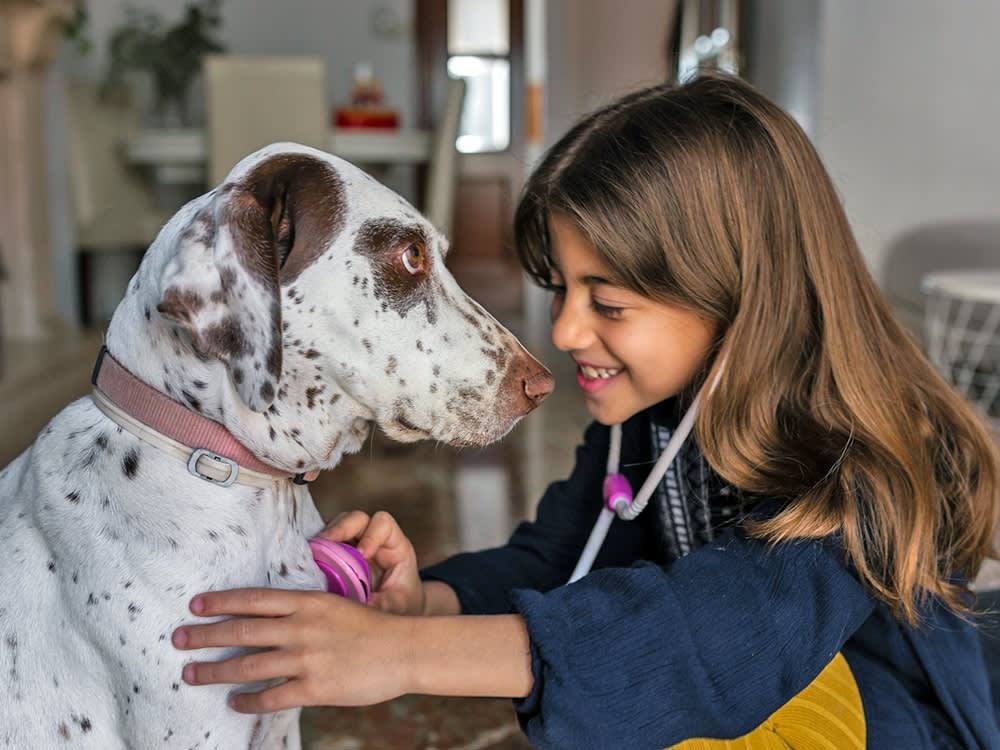Growing up With a Dog Is Good for Your Gut, New Study Finds
People who are raised with pups are less likely to develop Crohn’s disease, according to new research.

Share Article
It’s no secret that dogs are good for our health; studies have found that people with pups in their lives get more regular exercise, have lower blood pressure, are better at facing stress, are less likely to have chronic health conditions, and even have fewer allergies. Now, scientists have discoveredopens in a new tab an unexpected physical benefit of spending time with pups: People who have early exposure to dogs are less likely to develop Crohn’s disease, a chronic inflammatory bowel disease that is becoming more and more common worldwide.
The findings
Researchers at Sinai Health studied 4,289 first-degree relatives of patients with Crohn’s disease. They found that living with a dog between the ages of 5 to 15 was associated with a decreased risk of developing Crohn’s disease. People raised with pets also had greater gut microbial diversity.

Get (totally free) deals for food, treats, accessories, tech, and way more pet parenting must-haves.
opens in a new tab“We don’t know why living with a dog makes someone less prone to Crohn’s disease, but this is what our data shows,” said Dr. Kenneth Croitoru, a gastroenterologist at Mount Sinai Hospital, in a release.opens in a new tab “We have established associations between environmental factors and Crohn’s and are now trying to understand how these environmental factors affect the triggering the disease.”
Why it matters
Crohn’s disease is an inflammatory bowel diseaseopens in a new tab that causes inflammation in the digestive tract, which can lead to a variety of chronic symptoms including pain, malnutrition, and fatigue. It can sometimes lead to complications such as kidney stones, anemia, and inflammation of the liver. Approximately 6 to 8 million peopleopens in a new tab live with Crohn’s disease globally, and numbers are rising around the world.opens in a new tab There’s currently no known cure.
While some environmental factors have been shown to contribute to Crohn’s disease, scientists still don’t know exactly what causes the disease. There is a strong genetic component to Crohn’s disease, but environmental factors contribute, too. This study is one step to figuring out what causes Crohn’s disease and how the disease can be prevented. “By understanding what is different about those who develop the disease, we should be able to predict who is at risk,” Dr. Croitoru said.
The research team plans to conduct further studies to find out how to prevent the disease. “By integrating genetic, environmental, and microbial data, Dr. Croitoru and colleagues are paving the way towards personalized intervention strategies that could significantly reduce the incidence of Crohn’s disease," said Dr. Anne-Claude Gingras, Vice-President of Research for Sinai Health.
References

Sio Hornbuckle
Sio Hornbuckle is a writer living in New York City with their cat, Toni Collette.
Related articles
![Valentin Pujadas illustration]() opens in a new tab
opens in a new tabFYI, Pets Are Incredibly Good For Your Mental Health
Experts share the science-backed ways our pets offer us emotional support.
![Woman in athletic clothing jogging up stairs in a tropical city with her two dogs on leashes running with her]() opens in a new tab
opens in a new tabRunning With Your Dog Is Possible — It Doesn’t Just Happen in Photoshoots
You — yes you! — can be one of those fun people who runs with your dog. Just be smart about it.
![two people bonding and smiling over a dog]() opens in a new tab
opens in a new tabLoneliness Is a Public Health Crisis. Pets Can Help
Per the US Surgeon General, loneliness is as dangerous for your health as smoking 15 cigarettes a day. Here are ways pets can solve that.
![A woman with black hair surrounded by cats cuddling her]() opens in a new tab
opens in a new tab6 Science-Backed Ways Being a Pet Parent Improves Your Health
They say laughter is the best medicine, but so is a pet (especially one who makes you laugh).
![A woman walking with her dog in a garden.]() opens in a new tab
opens in a new tabHow to Take Your Dog On a Mindful Nature Walk
Wellness experts and animal trainers agree: A tuned-in outdoor outing can be restorative for both people and pets.
![A woman holding a dog in her arms while looking at a scenic view of the sea.]() opens in a new tab
opens in a new tab5 Science-Backed Ways to De-Stress Outdoors (Your Pet Is Invited)
The author of Return to Nature on the mental health benefits of getting out into various natural landscapes with your pup.






